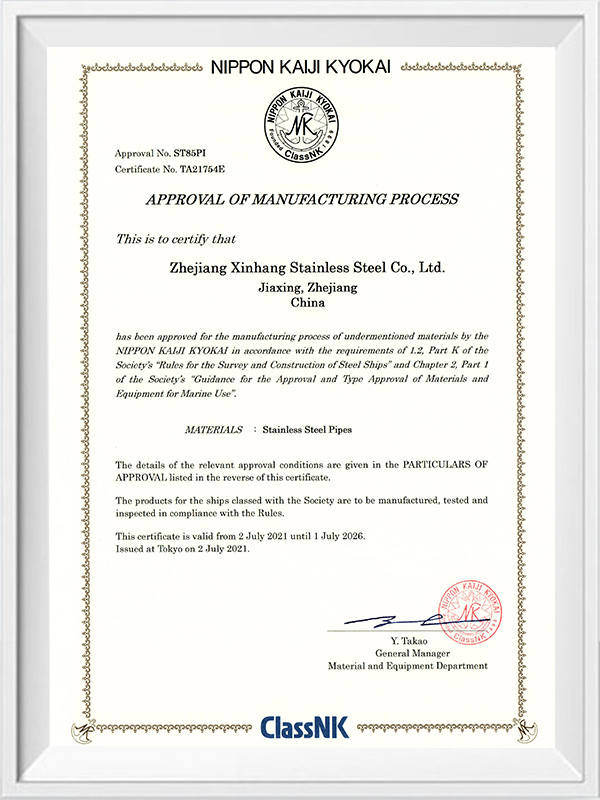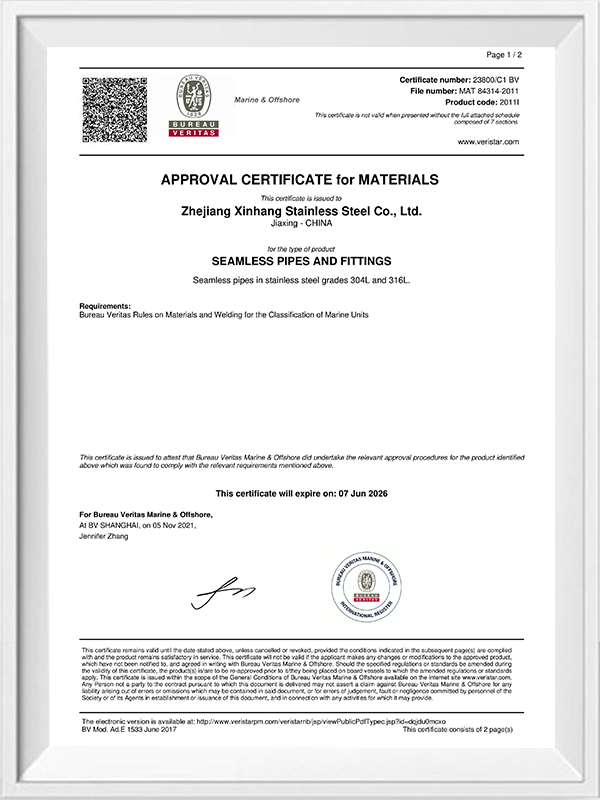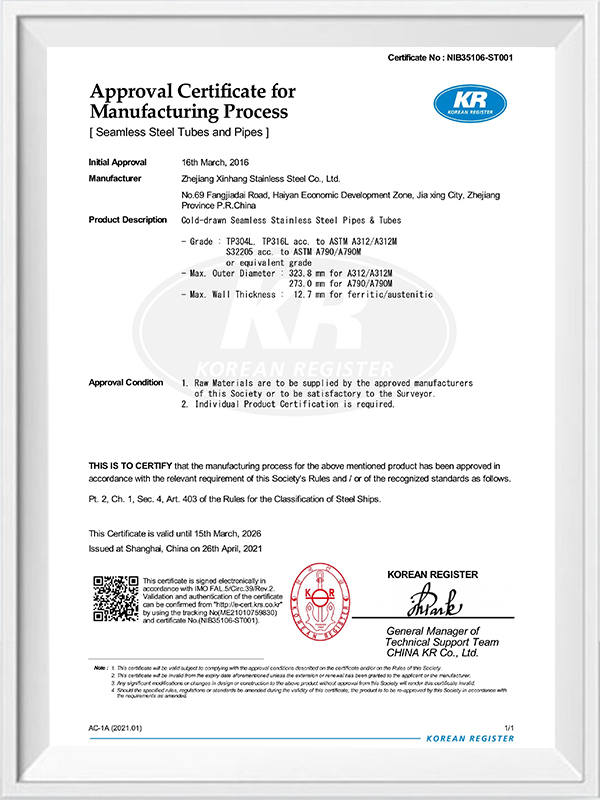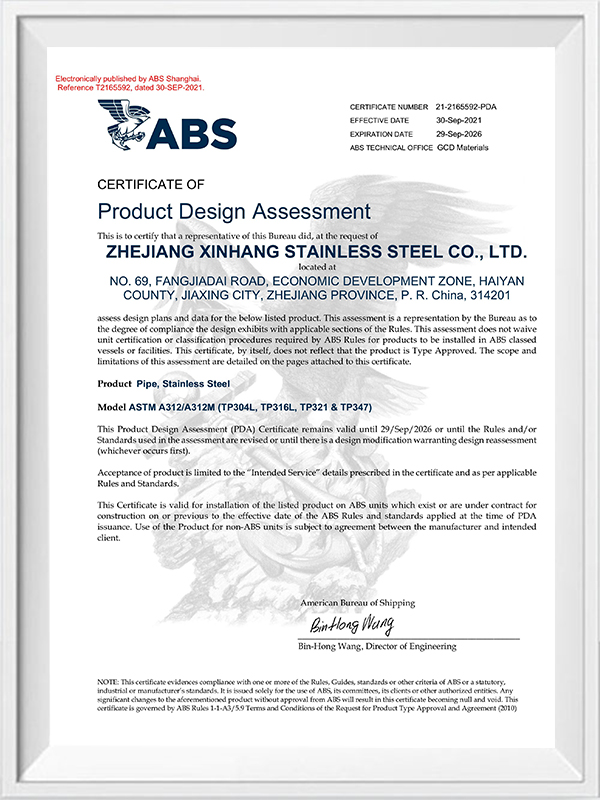

Xinhang Special Material Co., Ltd. Hangzhou Branch is China Stainless Steel Bright Annealing Tube Manufacturers and Stainless Steel Bright Annealing Pipe Factory, founded in 2007 and moved to Longyou Economic Development Zone, Zhejiang Province, in 2022. It covers an area of 130,000 square meters, more than 30 production lines, 300 workers, 20 R&D people, 30 inspection people and an annual output of 50,000 tons.
It has passed ISO9001:2008 quality management system, PED 97/23/EC EU Pressure Equipment Directive certification, China Special Equipment Manufacturing License (Pressure Tube) TS certification, ASME certification, provincial enterprise standardization management system, ISO14000:2004 environment management system, cleaner production (green enterprise), and a series of certifications, as well as China Classification Society (CCS), American Bureau of Shipping (ABS), British Register of Shipping (LR), Deutsche Veritas (GL), Bureau Veritas Society (BV), Det Norske Veritas (DNV), and Korean Register of Shipping (KR) factory certification.
The main products include stainless steel pipes, pipe fittings, flanges, valves, etc., which are widely used in petroleum, chemical industry, nuclear industry, smelting, shipbuilding, pharmaceuticals, food, water conservancy, electric power, new energy, mechanical equipment, and other fields. The company adheres to the corporate tenet of "quality for survival, reputation for development" and wholeheartedly serves every customer to create a win-win situation.




Bottom line: how to weld stainless steel pipe without sugar and leaks For most stainless steel pipe work, the most reli...
View MoreDirect answer: what a “stainless steel pipe pressure rating” really means A stainless steel pipe does not have one univ...
View MoreIn our shop, bending stainless steel pipe is one of those operations that looks simple but punishes shortcuts. Stainless...
View MoreWhat SCH 10 stainless steel pipe specifies (and what it doesn’t) In piping specifications, “SCH” (schedule) is shorthan...
View MoreHow does the manufacturing process of stainless steel BA tubes differ from other stainless steel tubing?
The manufacturing process of stainless steel BA tubes differs from other stainless steel tubing primarily in the finishing stage, aimed at achieving a bright, smooth surface finish with tight dimensional tolerances. Here's a breakdown of the key differences:
Cold Rolling: Like other stainless steel tubes, the process often starts with cold rolling, where stainless steel strips or coils are rolled to the desired thickness and diameter.
Annealing: After cold rolling, the stainless steel strip undergoes annealing, which involves heating the material to a specific temperature and then cooling it slowly to relieve internal stresses and improve ductility.
Bright Annealing: This is the distinctive step in manufacturing BA tubes. After annealing, the stainless steel strip is passed through a controlled atmosphere furnace where it is heated to a temperature above its recrystallization point but below its melting point. This process removes surface oxides and impurities, resulting in a clean, bright surface finish.
Quenching: Following the bright annealing process, the stainless steel strip is rapidly cooled or quenched to maintain the desired microstructure and surface finish.
Pickling and Passivation: Some BA tubes may undergo pickling and passivation treatments to further remove any residual oxides and enhance the corrosion resistance of the surface.
Final Sizing and Cutting: After the bright annealing process, the stainless steel strip is typically sized to the desired dimensions using precision sizing equipment. It may then be cut to specific lengths.
Can stainless steel BA pipes be easily welded or manipulated for custom applications?
Weldability: stainless steel BA pipes are typically made from austenitic stainless steel grades, such as 304 or 316, which are known for their excellent weldability. These grades can be welded using various methods including TIG (Tungsten Inert Gas) welding, MIG (Metal Inert Gas) welding, and resistance welding.
Precautions: While stainless steel is generally more forgiving to welding than other materials, precautions should be taken to prevent issues such as weld decay or sensitization, particularly in high-temperature or corrosive environments. Proper welding techniques, filler materials, and post-weld treatments (such as annealing or passivation) may be necessary to ensure the integrity of the weld and the corrosion resistance of the material.
Manipulation: Stainless steel BA tubes can be easily manipulated for custom applications such as bending, flaring, expanding, or machining. However, care should be taken to avoid damaging the surface finish during these processes, especially if the aesthetic appearance of the tube is important for the application.
Consultation: For complex or critical applications, it's advisable to consult with a qualified engineer or welding specialist to ensure that the chosen stainless steel BA tube and welding techniques are suitable for the specific requirements of the project.
While stainless steel BA pipes can generally be welded and manipulated for custom applications, proper techniques and precautions should be followed to maintain the desired properties and performance of the material.
We'll never share your email address and you
can opt out at any time, we promise.